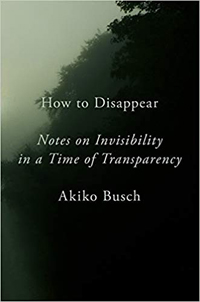 Akiko Busch, How to Disappear: Notes on Invisibility in a Time of Transparency (New York: Penguin, 2019), 207pp.
Akiko Busch, How to Disappear: Notes on Invisibility in a Time of Transparency (New York: Penguin, 2019), 207pp.
In his 2013 novel The Circle, Dave Eggers captures our technological Zeitgeist by following the fortunes of a young woman named Mae. Mae is two years out of college. She left her job at an old school utility company, a "gulag" that actually served a social purpose, to work at The Circle in Silicon Valley — the most important and admired internet company in the world, "the only company that really mattered at all."
The Circle campus and everything about it is a Googlesque corporate utopia: "My God, it's heaven," Mae gushes. There's everything anyone could want for work or play, including dorms where workers sleep. The Circle is led by The Three Wise Men. The more you learn about the Circle the more you realize that it's a case study of a cult.
The corporate mantra is Total Transparency by all and for all. After all, Circle is a Community. The Circle must be made Whole, Closed and Completed. And so the core beliefs of the company, which Eggers puts in all caps: SECRETS ARE LIES, SHARING IS CARING, PRIVACY IS THEFT. Nothing should ever be deleted, which isn't a problem anyway because the powerful technologies of the Circle make that impossible.
Like Eggers' novel, Akiko Busch's new book of eleven essays explores our culture of social media and surveillance economy. In our "orgies of disclosure" and "cult of transparency," when companies track every click of your mouse in order to create and then sell complicated algorithms of Big Data (you are the product, not the consumer), privacy is a nostalgic notion of the past. No wonder that Mark Zuckerberg is known to cover the lens on his smart phone camera with a piece of tape.
"It is time," says Busch, "to question the false equivalency between not being seen and hiding. And time to reevaluate the merits of the inconspicuous life, to search out some antidote to continuous exposure, and to reconsider the value of going unseen, undetected, or overlooked in this new world. Might invisibility be regarded not simply as refuge, but as a condition with its own meaning and power? Going unseen may be becoming a sign of decency and self-assurance. The impulse to escape notice is not about complacent isolation or senseless conformity, but about maintaining identity, propriety, autonomy, and voice. It is not about retreating from the digital world but about finding some genuine alternative to a life of perpetual display. It is not about mindless effacement but mindful awareness. Neither disgraceful nor discrediting, such obscurity can be vital to our very sense of being, a way of fitting in with the immediate social, cultural, or environmental landscape. Human endeavor can be something interior, private, and self-contained. We can gain, rather than suffer, from deep reserve."
There is a power of interiority and absence in our age of exposure, says Busch. So imagine it — a counter cultural life of elective invisibility, concealment, anonymity, obscurity, and privacy. A life that is unknown and unseen. Busch reminded me of how 90% of Jesus's life remains totally unknown to us, and how in the Beatitudes Jesus calls us to give, to pray, and to fast "in secret" (Matthew 6:4, 6, 18). The unseen Father, says Jesus, "sees what is done" in secret. For more on this theme see my review of the book by Jonathan Malesic, Secret Faith in the Public Square; An Argument for the Concealment of Christian Identity (Grand Rapids: Brazos Press, 2009), 248pp.
Dan Clendenin: dan@journeywithjesus.net


